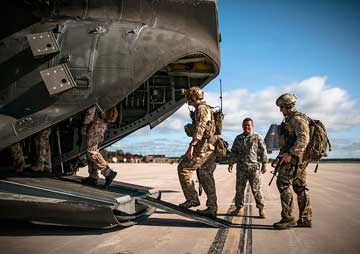Bombs, Boots and Bluster Won’t Work
President Obama's strategy against the Islamic State may be hard to pin down -- maddeningly so, some complain -- but it is likely to work far better than anything his bellicose critics advocate. U.S. Air National Guard/Master Sgt. Scott Thompson
U.S. Air National Guard/Master Sgt. Scott Thompson
U.S. Air National Guard/Master Sgt. Scott Thompson
President Obama’s strategy against the Islamic State may be hard to pin down — maddeningly so, some complain — but it is likely to work far better than anything his bellicose critics advocate.
Perhaps the president will eliminate any confusion when he addresses the nation Wednesday, but I doubt it. Based on what he told NBC’s Chuck Todd on “Meet the Press,” there may be no way to reduce Obama’s fluid and perhaps deliberately ambiguous thinking to a black-or-white, all-or-nothing dichotomy.
“This is not going to be an announcement about U.S. ground troops. This is not the equivalent of the Iraq War,” Obama said. Later in the interview, he added that “we’re not looking at sending in 100,000 American troops” and that “our goal should not be to think that we can occupy every country where there’s a terrorist organization.”
Clear? Kind of.
We understand that the president will not announce the deployment of U.S. troops in large numbers and that he does not intend for the United States to re-invade and re-occupy Iraq. But we know that U.S. military advisers and special operations teams have already been active in both Iraq and Syria. And since Obama described the fight against the Islamic State as “similar to the kinds of counterterrorism campaigns that we’ve been engaging in consistently over the last five, six, seven years,” we can assume there will be some U.S. military presence on the ground, however covert and limited.
A strong believer in multilateralism, the president asserted that “we have, I believe, a broad-based coalition internationally and regionally to be able to deal with the problem.”
True? Again, kind of.
The 10-nation coalition assembled last week to fight the Islamic State — the United States plus Australia and NATO members Britain, France, Germany, Canada, Turkey, Italy, Poland and Denmark — is much less than meets the eye, operationally speaking. Britain, France, Australia and Canada have the will and capacity to project military power overseas. The others, not so much.
As far as regional cooperation is concerned, perhaps Turkey can be counted on to help tear down the Islamic State. But assistance from two key powers in the Middle East that also find themselves threatened by the jihadist group — Iran and Saudi Arabia — promises to be tenuous and situational at best.
To further complicate a situation that already seems hopelessly complicated, every blow against the Islamic State is a blow in favor of Syria’s Bashar al-Assad and his murderous regime. But Obama implied on “Meet the Press” that Assad is a secondary concern and said that “when it comes to our policy and the coalition that we’re putting together, our focus specifically is on ISIL,” another name for the Islamic State.
In internal administration discussions, Obama has reportedly been skeptic-in-chief about the capabilities of the ostensibly “moderate” Syrian rebels. On Sunday, the president was less than fulsome in his praise of groups such as the Free Syrian Army, which he noted “have been on the defensive.” He said “we’re going to have to develop a moderate Sunni opposition that can control territory,” indicating that no such opposition now exists.
It all sounds kind of circular and vague, implying there is much that may be planned, or already taking place, that we know nothing about. Obama seems to give himself the option of confronting the Islamic State directly when he chooses, ignoring it when he feels it can be ignored, using airstrikes when he believes they are needed, cooperating with adversarial or unreliable governments only when he believes it is in the U.S. interest to do so.
I don’t know if it will work. But I’m confident that the hawkish alternative — more bombs, more boots, more bluster — would be a tragic failure.
Massive airstrikes in both Iraq and Syria probably would not be enough to destroy the Islamic State without ground support. In Iraq, such support has been inconsistent. In Syria, it could come only from Assad’s brutal army. If U.S. troops are not an option, should we encourage Saudi Arabia and even Iran to deploy their forces? To me, that sounds like fighting a fire with gasoline.
To the hawks, Obama’s cautious, patient, this-could-take-years approach to dealing with the Islamic State will be emotionally unsatisfying. But, given the complexity of the situation, subtlety and indirection are more promising tools than brute force. Locking the United States into the kind of rigid strategy that critics demand would likely only ensure that this crisis sows the seeds of the next one.
Eugene Robinson’s e-mail address is eugenerobinson(at)washpost.com.
© 2014, Washington Post Writers Group
Your support matters…Independent journalism is under threat and overshadowed by heavily funded mainstream media.
You can help level the playing field. Become a member.
Your tax-deductible contribution keeps us digging beneath the headlines to give you thought-provoking, investigative reporting and analysis that unearths what's really happening- without compromise.
Give today to support our courageous, independent journalists.









You need to be a supporter to comment.
There are currently no responses to this article.
Be the first to respond.